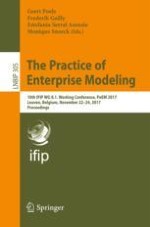2017 | OriginalPaper | Chapter
NEXT: Generating Tailored ERP Applications from Ontological Enterprise Models
Authors : Henk van der Schuur, Erik van de Ven, Rolf de Jong, Dennis Schunselaar, Hajo A. Reijers, Michiel Overeem, Machiel de Graaf, Slinger Jansen, Sjaak Brinkkemper
Published in: The Practice of Enterprise Modeling
Publisher: Springer International Publishing
Activate our intelligent search to find suitable subject content or patents.
Select sections of text to find matching patents with Artificial Intelligence. powered by
Select sections of text to find additional relevant content using AI-assisted search. powered by

